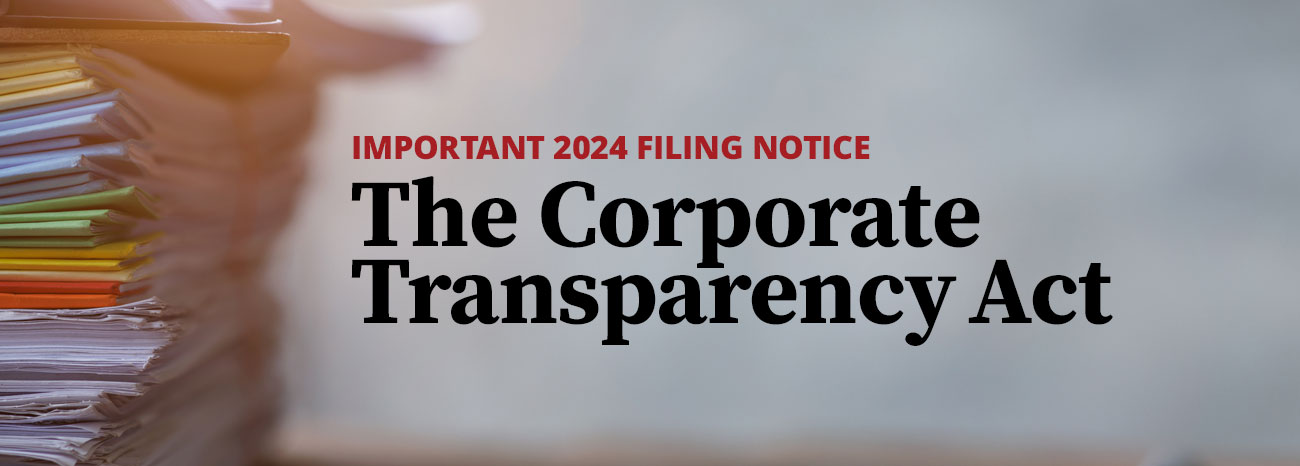Many Business Entities Will Have New Reporting Requirements Beginning January, 2024

The Corporate Transparency Act goes into effect on January 1, 2024, triggering a new set of federal reporting requirements that will impact millions of business entities. The Corporate Transparency Act (“Act”) was passed in 2021 to combat money-laundering.
Unless exempt from the Act, all business entities will have to file a Beneficial Ownership Information Report with the Financial Crimes Enforcement Network (“Fin CEN”), a division of the U.S. Treasury Department.
FinCEN will begin accepting reports on January 1, 2024 through its online system. There will be no filing fee for either initial or updated filings.
When are filings due?
Business entities in existence before January 1, 2024, are required to file a Beneficial Ownership Information (“BOI”) before January 1, 2025.
However, new business entities being created during 2024 only have 90 days from the date of creation to file a BOI with FinCEN. In the future, business entities will only have 30 days to file for any entity created in 2025 or later.
According to FinCEN, the BOI is not a recurring filing, and there will not be annual maintenance required. However, Reporting Companies will be required to update their filings within 30 days of any changes in Beneficial Owner Information.
What companies are subject to the new reporting requirements?
Business entities that are required to file a BOI are called “Reporting Companies”. A Reporting Company is defined as any domestic entity that is created by filing documents (i.e. Certificate of Formation or Articles of Incorporation) with a secretary of state or similar office. This definition includes but is not limited to commonly used forms of business entities such as corporations, limited liability companies, and limited partnerships. Business trusts and other entities may be Reporting Companies in states where the filing requirement is met.
There are more than twenty specific types of entities that are exempt from reporting requirements and do not have to file a BOI. Some of these are subject to other reporting requirements such as banks, insurance companies, and securities brokers. Others are more practical, such as inactive entities with no assets, tax-exempt entities, and government authorities.
Perhaps the most significant exception is for a “Large Operating Company” which employees 20 full-time employees in the U.S., maintains an operating office physically in the U.S., and reported more than $5 million in gross receipts or sales from U.S. sources on its last federal tax return.
What information must be reported, and about whom?
Reporting Companies will be required to provide information about the individual filing the report and every “Beneficial Owner” of the business, including the individual’s name, address, date of birth, and a government-issued photo ID.
A “Beneficial Owner” is defined as a person who owns 25% of the Reporting Company, who “controls” 25% of the Reporting Company’s ownership interests, and anyone directly or indirectly exercising “substantial control” over the Reporting Company. The rules concerning who has substantial control are complex and should be evaluated carefully on a case by case basis. A person with substantial control may not own any interest in the company at all, and may include senior officers (President, CEO, CFO, etc.), members of the board of directors, LLC managers, and “important decision-makers”.
There are also several exceptions to the definition of a Beneficial Owner. These exceptions include minors, future interest holders by inheritance, and individuals whose decision-making authority is derived entirely from at-will employment status.
Another important note is that Beneficial Owners can only be individuals. Where the requisite ownership or control is held by another entity, actual individuals that exercise substantial control through the other entity must be reported as the Beneficial Owners.
Penalties
Stiff penalties may apply to a company for failing to report or update Beneficial Owner Information. In the most extreme cases, “willful failure” to comply may result in civil penalties of up to $500 for each day that the violation continues, or criminal penalties including imprisonment for up to two years and a fine of up to $10,000. Senior officers may be held accountable if an entity fails to file a required BOI report. Where an individual refuses to provide accurate information needed for a filing, they can also be subject to penalties.
Conclusion
The Corporate Transparency Act introduces a significant new reporting requirement for many U.S. businesses. Existing business entities have all of 2024 to complete this requirement, but should make plans to check this off their to-do list for 2024. New business entities will have to file reports within 90 days of establishing their business entity in 2024.
For questions about how the Corporate Transparency Act may affect your business entity, or assistance with completing the reporting requirement, contact your attorney at Timoney Knox.
Timoney Knox's Business, Corporate, and Tax Law Group
Timoney Knox’s Business, Corporate, and Tax Law Group has the knowledge, insight, perspective, and skills required to regularly assist both established and start-up companies with complex corporate and transactional matters. Our clients turn to us knowing they will receive excellent service and advice based on industry knowledge, economic factors, market opportunities, managed risk, and a comprehensive command of federal, state, and local laws and regulations governing our clients’ businesses.







